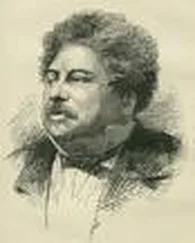Alexandre Dumas - Louise de la Valliere
Здесь есть возможность читать онлайн «Alexandre Dumas - Louise de la Valliere» — ознакомительный отрывок электронной книги совершенно бесплатно, а после прочтения отрывка купить полную версию. В некоторых случаях можно слушать аудио, скачать через торрент в формате fb2 и присутствует краткое содержание. Жанр: literature_19, foreign_antique, foreign_prose, на английском языке. Описание произведения, (предисловие) а так же отзывы посетителей доступны на портале библиотеки ЛибКат.
- Название:Louise de la Valliere
- Автор:
- Жанр:
- Год:неизвестен
- ISBN:нет данных
- Рейтинг книги:5 / 5. Голосов: 1
-
Избранное:Добавить в избранное
- Отзывы:
-
Ваша оценка:
- 100
- 1
- 2
- 3
- 4
- 5
Louise de la Valliere: краткое содержание, описание и аннотация
Предлагаем к чтению аннотацию, описание, краткое содержание или предисловие (зависит от того, что написал сам автор книги «Louise de la Valliere»). Если вы не нашли необходимую информацию о книге — напишите в комментариях, мы постараемся отыскать её.
Louise de la Valliere — читать онлайн ознакомительный отрывок
Ниже представлен текст книги, разбитый по страницам. Система сохранения места последней прочитанной страницы, позволяет с удобством читать онлайн бесплатно книгу «Louise de la Valliere», без необходимости каждый раз заново искать на чём Вы остановились. Поставьте закладку, и сможете в любой момент перейти на страницу, на которой закончили чтение.
Интервал:
Закладка:
“Only be very careful of any letters.”
“I will hand them to you as I receive them.”
“What shall we tell the king about Madame?”
“That Madame is still in love with his majesty.”
“What shall we tell Madame about the king?”
“That she would be exceedingly wrong not to humor him.”
“What shall we tell La Valliere about Madame?”
“Whatever we choose, for La Valliere is in our power.”
“How so?”
“Every way.”
“What do you mean?”
“In the first place, through the Vicomte de Bragelonne.”
“Explain yourself.”
“You do not forget, I hope, that Monsieur de Bragelonne has written many letters to Mademoiselle de la Valliere.”
“I forget nothing.”
“Well, then, it was I who received, and I who intercepted those letters.”
“And, consequently, it is you who have them still?”
“Yes.”
“Where, – here?”
“Oh, no; I have them safe at Blois, in the little room you know well enough.”
“That dear little room, – that darling little room, the ante-chamber of the palace I intend you to live in one of these days. But, I beg your pardon, you said that all those letters are in that little room?”
“Yes.”
“Did you not put them in a box?”
“Of course; in the same box where I put all the letters I received from you, and where I put mine also when your business or your amusements prevented you from coming to our rendezvous.”
“Ah, very good,” said Malicorne.
“Why are you satisfied?”
“Because I see there is a possibility of not having to run to Blois after the letters, for I have them here.”
“You have brought the box away?”
“It was very dear to me, because it belonged to you.”
“Be sure and take care of it, for it contains original documents that will be of priceless value by and by.”
“I am perfectly well aware of that indeed, and that is the very reason why I laugh as I do, and with all my heart, too.”
“And now, one last word.”
“Why last? ”
“Do we need any one to assist us?”
“No one.”
“Valets or maid-servants?”
“Bad policy. You will give the letters, – you will receive them. Oh! we must have no pride in this affair, otherwise M. Malicorne and Mademoiselle Aure, not transacting their own affairs themselves, will have to make up their minds to see them done by others.”
“You are quite right; but what is going on yonder in M. de Guiche’s room?”
“Nothing; he is only opening his window.”
“Let us be gone.” And they both immediately disappeared, all the terms of the contract being agreed on.
The window just opened was, in fact, that of the Comte de Guiche. It was not alone with the hope of catching a glimpse of Madame through her curtains that he seated himself by the open window for his preoccupation of mind had at that time a different origin. He had just received, as we have already stated, the courier who had been dispatched to him by Bragelonne, the latter having written to De Guiche a letter which had made the deepest impression upon him, and which he had read over and over again. “Strange, strange!” he murmured. “How irresponsible are the means by which destiny hurries men onward to their fate!” Leaving the window in order to approach nearer to the light, he once more read the letter he had just received: —
“CALAIS.
“MY DEAR COUNT, – I found M. de Wardes at Calais; he has been seriously wounded in an affair with the Duke of Buckingham. De Wardes is, as you know, unquestionably brave, but full of malevolent and wicked feelings. He conversed with me about yourself, for whom, he says, he has a warm regard, also about Madame, whom he considers a beautiful and amiable woman. He has guessed your affection for a certain person. He also talked to me about the lady for whom I have so ardent a regard, and showed the greatest interest on my behalf in expressing a deep pity for me, accompanied, however, by dark hints which alarmed me at first, but which I at last looked upon as the result of his usual love of mystery. These are the facts: he had received news of the court; you will understand, however, that it was only through M. de Lorraine. The report goes, so says the news, that a change has taken place in the king’s affections. You know whom that concerns. Afterwards, the news continues, people are talking about one of the maids of honor, respecting whom various slanderous reports are being circulated. These vague phrases have not allowed me to sleep. I have been deploring, ever since yesterday, that my diffidence and vacillation of purpose, notwithstanding a certain obstinacy of character I may possess, have left me unable to reply to these insinuations. In a word, M. de Wardes was setting off for Paris, and I did not delay his departure with explanations; for it seemed rather hard, I confess, to cross-examine a man whose wounds are hardly yet closed. In short, he travelled by short stages, as he was anxious to leave, he said, in order to be present at a curious spectacle the court cannot fail to offer within a short time. He added a few congratulatory words accompanied by vague sympathizing expressions. I could not understand the one any more than the other. I was bewildered by my own thoughts, and tormented by a mistrust of this man, – a mistrust which, you know better than any one else, I have never been able to overcome. As soon as he left, my perceptions seemed to become clearer. It is hardly possible that a man of De Wardes’s character should not have communicated something of his own malicious nature to the statements he made to me. It is not unlikely, therefore, that in the strange hints De Wardes threw out in my presence, there may be a mysterious signification, which I might have some difficulty in applying either to myself or to some one with whom you are acquainted. Being compelled to leave as soon as possible, in obedience to the king’s commands, the idea did not occur to me of running after De Wardes in order to ask him to explain his reserve; but I have dispatched a courier to you with this letter, which will explain in detail my various doubts. I regard you as myself; you have reflected and observed; it will be for you to act. M. de Wardes will arrive very shortly; endeavor to learn what he meant, if you do not already know. M. de Wardes, moreover, pretended that the Duke of Buckingham left Paris on the very best of terms with Madame. This was an affair which would have unhesitatingly made me draw my sword, had I not felt that I was under the necessity of dispatching the king’s mission before undertaking any quarrel whatsoever. Burn this letter, which Olivain will hand you. Whatever Olivain says, you may confidently rely on. Will you have the goodness, my dear comte, to recall me to the remembrance of Mademoiselle de la Valliere, whose hands I kiss with the greatest respect.
“Your devoted
“DE BRAGELONNE.
“P. S. – If anything serious should happen – we should be prepared for everything, dispatch a courier to me with this one single word, ‘come,’ and I will be in Paris within six and thirty hours after the receipt of your letter.”
De Guiche sighed, folded up the letter a third time, and, instead of burning it, as Raoul had recommended him to do, placed it in his pocket. He felt it needed reading over and over again.
“How much distress of mind, yet what sublime confidence, he shows!” murmured the comte; “he has poured out his whole soul in this letter. He says nothing of the Comte de la Fere, and speaks of his respect for Louise. He cautions me on my own account, and entreats me on his. Ah!” continued De Guiche, with a threatening gesture, “you interfere in my affairs, Monsieur de Wardes, do you? Very well, then; I will shortly occupy myself with yours. As for you, poor Raoul, – you who intrust your heart to my keeping, be assured I will watch over it.”
Читать дальшеИнтервал:
Закладка:
Похожие книги на «Louise de la Valliere»
Представляем Вашему вниманию похожие книги на «Louise de la Valliere» списком для выбора. Мы отобрали схожую по названию и смыслу литературу в надежде предоставить читателям больше вариантов отыскать новые, интересные, ещё непрочитанные произведения.
Обсуждение, отзывы о книге «Louise de la Valliere» и просто собственные мнения читателей. Оставьте ваши комментарии, напишите, что Вы думаете о произведении, его смысле или главных героях. Укажите что конкретно понравилось, а что нет, и почему Вы так считаете.












